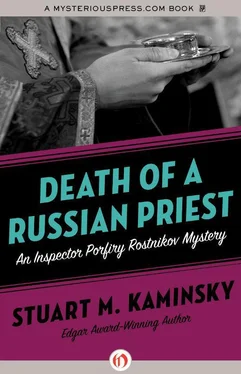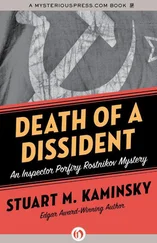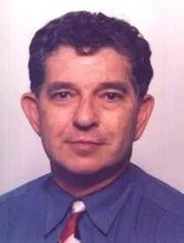Stuart Kaminsky - Death Of A Russian Priest
Здесь есть возможность читать онлайн «Stuart Kaminsky - Death Of A Russian Priest» весь текст электронной книги совершенно бесплатно (целиком полную версию без сокращений). В некоторых случаях можно слушать аудио, скачать через торрент в формате fb2 и присутствует краткое содержание. Год выпуска: 2012, Жанр: Полицейский детектив, на английском языке. Описание произведения, (предисловие) а так же отзывы посетителей доступны на портале библиотеки ЛибКат.
- Название:Death Of A Russian Priest
- Автор:
- Жанр:
- Год:2012
- ISBN:нет данных
- Рейтинг книги:3 / 5. Голосов: 1
-
Избранное:Добавить в избранное
- Отзывы:
-
Ваша оценка:
- 60
- 1
- 2
- 3
- 4
- 5
Death Of A Russian Priest: краткое содержание, описание и аннотация
Предлагаем к чтению аннотацию, описание, краткое содержание или предисловие (зависит от того, что написал сам автор книги «Death Of A Russian Priest»). Если вы не нашли необходимую информацию о книге — напишите в комментариях, мы постараемся отыскать её.
Death Of A Russian Priest — читать онлайн бесплатно полную книгу (весь текст) целиком
Ниже представлен текст книги, разбитый по страницам. Система сохранения места последней прочитанной страницы, позволяет с удобством читать онлайн бесплатно книгу «Death Of A Russian Priest», без необходимости каждый раз заново искать на чём Вы остановились. Поставьте закладку, и сможете в любой момент перейти на страницу, на которой закончили чтение.
Интервал:
Закладка:
“I don’t care what he does to his child,” Elena said, turning her head from the window to her aunt.
“He is young,” said Anna.
“He is only two years younger than I,” said Elena. She examined the uneven piece of bread she had just cut.
“In years,” said Anna. “In experience perhaps he is older, but in emotions, no. I’ve known him since he was twenty-three or twenty-four. What he wanted yesterday, he no longer wants today, and what he wants today will be forgotten tomorrow in the self-pity of not knowing what he wants. But he is a good policeman. I bought him a scarf from one of the old ladies. We’ll give it to him at the birthday party.”
“Fine,” said Elena.
The cat had taken the chair at the window and was curled up in front of Anna’s book.
“The Arab girl …?” asked Anna.
“Amira Durahaman.”
“You haven’t found her.”
“No. That’s where we’re going tonight. To look for her. Her boyfriend was murdered this morning, a young Jew.”
Anna watched as her niece moved to the window and looked out, then leaned forward to scratch Baku’s head and reach for the book.
“What are you reading?” Elena asked.
“Minds,” said Anna Timofeyeva. “Today I am reading minds, your mind. He is a good-looking young man.”
“Who?” asked Elena, examining the book.
“Who? Chairman Mao. You know who,” said Anna. She went over to the table and tried to place the cup of keefeer on the plate next to the bread and tomato in an appealing arrangement. “Let’s eat.”
Elena put the book down, scratched Baku’s head once more, and took her place at the table. Anna poured the soup and placed a plate of food in front of her. They ate in silence for a few minutes.
“I can’t work with him,” Elena said.
“He is a good investigator,” replied Anna. “Smart. But too passionate.”
“You said that.”
“I suffer from lapses of short-term memory and the belief that the young are inattentive,” Anna said.
Anna Timofeyeva knew that there was a highly classified file on Sasha Tkach’s indiscretions, a file of which he was not aware. There were thousands of such files-on members of the MVD, on government officials-files that Anna Timofeyeva had once had access to, and could still examine if she wished to do so. She wondered what the new zealots would do with this information.
“I don’t think he will ever be able to control his passions,” Anna said, “which is why I think he should not make a career as a policeman.”
“A minute ago you said he was a good policeman,” said Elena. “You see I am listening.”
“A person can be a fine butcher and hate the sight of blood.”
“It is unlikely that if he hated the sight of blood he would become a butcher,” countered Elena.
“Destiny often hands us a sword too heavy to carry.”
“You are being cryptic,” said Elena, tearing off a piece of bread from the loaf. “You are reading too much Freud.”
“I’ve been reading too much Gogol,” said Anna with a sigh. “All right. I’ll be direct. Better for you if Tkach was byeezahbrahnay, ugly. The food is all right?”
“It’s fine,” said Elena.
“It’s soggy, the tomato, the bread,” said Anna. She put her half-finished plate on the floor, and Baku leaped from the chair to eat. “And the soup is hot water with three onions.”
“He might get me hurt, even killed,” said Elena.
“Let us hope you survive at least your second week. Your mother would never forgive me.”
“I must get back to work.”
“Trust his instincts and experience, question his passions,” Anna said, reaching down to pet Baku, whose head was bent over the cup of keefeer.
“Can I ask you a question?” asked Elena, rolling a crumb of bread in her fingers.
Anna had carried her niece’s plate to the sink in the corner. “You mean, may you ask a question which might make me feel uncomfortable? Since I am curious, ask.”
“Are you bitter?”
“Bitter? About …?”
“The system you worked for is gone. The Soviet Union has gone. The memory of Lenin is dying. The law-”
“-remains the law,” said Anna, turning to her niece. “I did not dedicate my life to a cause. I dedicated my life to the law. The goal was to improve the law and to seek justice within it. There was nothing wrong with Soviet law. The problem was in its corruption.”
“You are being philosophical today,” said Elena.
“Philosophy is the perfect exercise for a woman with nothing to do but walk and read about hysteria.”
Elena moved back to the chair by the window, sat, and put on her shoes. Then she went to the battered wooden wardrobe in the corner, opened it, selected a clean blouse, and moved to the small bathroom to examine herself in the mirror. “I’m getting fat,” she said.
“It is your genetic burden,” said Anna. “Along with intelligence and determination. Your mother is heavy. I am heavy. But you are also pretty. You won’t be truly fat like us for ten years, twenty if you are careful.”
“Thank you,” Elena said as she came out of the bathroom, buttoning her blouse. “You are very reassuring.”
“I am very practical,” said Anna. “You want lies? Read Izvestia. ”
“I suppose I want the truth cushioned,” Elena said, putting on her coat.
“It is still the truth. Besides, I don’t know how to do that.” Anna leaned over to pick up Baku’s clean plate. “It is a skill, like cooking, which I never learned.”
“I don’t know what time I will be back,” said Elena.
“Baku, Freud, Gogol, and I will be here,” said Anna Timofeyeva, moving back toward the chair near the window. “Maybe we’ll watch some television. ‘Wheel of Fortune.’ Who knows? The night is still young.”
“Aunt Anna,” Elena said.
“You look fine,” her aunt replied. “You look modern, efficient, pretty, determined. If I am sitting here with my eyes closed when you return, be sure I’m alive and then let me sleep.”
Elena kissed her aunt’s head and left the apartment.
Anna Timofeyeva folded her hands on the book in her lap and looked into the darkness of the courtyard. The babushkas and children were gone. There was nothing to see but the lights in the windows.
“Well, Baku, what will it be, Gogol, Freud, or ‘Wheel of Fortune’?”
Baku looked up at her and blinked his eyes.
“So?” Lydia said, placing a bowl of borscht in front of her son.
“So?” repeated Sasha Tkach, looking down at the dark red liquid filled with beets and a very small white touch of what may have been sour cream.
Lydia Tkach was a proud woman of sixty-six who was almost deaf and quite unwilling to admit it. She continued to work, as she had for more than forty years, in the Ministry of Information Building, filing papers and telling anyone who would listen that her son was a high-ranking government official, a key adviser to the minister of the interior.
Sasha knew that his mother was no more popular in the Ministry of Information than she was at home. People avoided her because she drew attention to herself with her loud conversation. This tended to make her more lonely and crotchety with those who could not avoid her, particularly her son and daughter-in-law.
Maya had insisted on getting up to sit across from her husband while he ate a hurried meal. Pulcharia sat on her father’s lap. Maya’s lap had slowly disappeared as the baby grew within her.
“So?” Lydia repeated to her son.
Sasha looked at his wife, who smiled in sympathy. Maya’s stomach was large, low, and very round, but her usually beautiful round face was pale and thin, which made Sasha angry, which was easier than being frightened. He did not want her to be sick. He wanted her to be vital, well, warm, and supportive.
Читать дальшеИнтервал:
Закладка:
Похожие книги на «Death Of A Russian Priest»
Представляем Вашему вниманию похожие книги на «Death Of A Russian Priest» списком для выбора. Мы отобрали схожую по названию и смыслу литературу в надежде предоставить читателям больше вариантов отыскать новые, интересные, ещё непрочитанные произведения.
Обсуждение, отзывы о книге «Death Of A Russian Priest» и просто собственные мнения читателей. Оставьте ваши комментарии, напишите, что Вы думаете о произведении, его смысле или главных героях. Укажите что конкретно понравилось, а что нет, и почему Вы так считаете.












